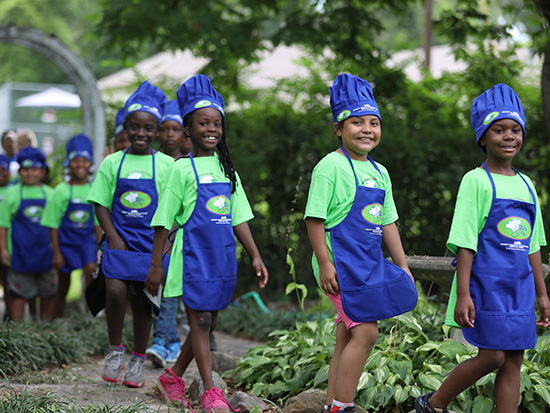 Photography: Quez ShipmanThe University of Alabama at Birmingham’s Minority Health and Health Equity Research Center and the Birmingham City Schools system celebrated the graduation of more than 2,300 students from the Healthy Happy Kids program May 3.
Photography: Quez ShipmanThe University of Alabama at Birmingham’s Minority Health and Health Equity Research Center and the Birmingham City Schools system celebrated the graduation of more than 2,300 students from the Healthy Happy Kids program May 3.
HHK is an eight-week after-school program that focuses on teaching children what their bodies need to stay healthy so they can potentially avoid obesity-related chronic diseases when they are older.
The MHERC developed the program using evidence-based research and best practices. In the past, classes were led by nutritionists and exercise experts and the MHERC delivered HHK at two elementary schools a year.
This year, the MHERC redesigned HHK so that teachers and after-school care directors could teach the classes. Now with support of funding partners and community resources, HHK is implemented at every elementary school in the Birmingham City Schools system. More than 200 BCS after-school care directors are trained as HHK leaders and are teaching HHK to more than 2,300 students in 24 after-school care programs.
“The first time we partnered with the MHERC in 2008, I knew this was a program that our children needed,” said Cathy McCord Baugh, after-school care program coordinator at BCS. “I wanted our students to learn about healthy eating and physical activity; but until now, that was only a dream. Now every student in our after-school programs will learn how to be healthy, happy kids. This new model is so wonderful. The MHERC taught our staff how to implement HHK, and they have provided all the resources we needed to make it successful.”
With one-third of children in Alabama overweight, programs like HHK play a crucial role in teaching children about the importance of good health.
The HHK program focuses on a different health and physical activity topic each week, encouraging children to make healthier choices.
At the graduation ceremony, which took place at all 24 elementary schools May 3, the children dressed in HHK aprons and chef hats and were presented with HHK kits that include T-shirts, jump ropes, Frisbees and volleyballs to remind them to stay active at home.
“We are thrilled to see the impact HHK has had on the lives of Birmingham’s children,” said Tiffany Osborne, director of Community Engagement at MHERC. “Thanks to the incredible support of the MHERC Young Professionals Board, Protective Life Foundation, Birmingham City Schools and Live HealthSmart Alabama, we have been able to provide schools with the necessary tools to succeed, allowing us to reach more children than ever before. We’re excited to continue making a positive difference in the lives of our community’s children.”